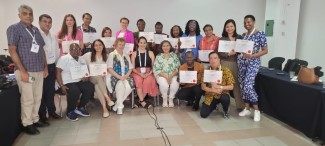Women: Insights from the WISE Training at ISSUP Conference 2024

Did you know that women with substance use disorders are more likely to encounter obstacles across the continuum of care? Despite the unique challenges, women are more likely to engage in help-seeking behavior. This was one of the key take-home while attending the Women’s Intervention for Substance Use Exposure: Comprehensive Care for Substance Use Disorders (WISE) training during the recently concluded ISSUP Conference 2024 in Thessaloniki Greece.
The conference aptly titled "Art of Healing: A New Era in Substance Use Prevention, Harm Reduction, Treatment, and Recovery Support," provided a rich tapestry of knowledge, innovation, and inspiration. For me, I had the privilege to attend three courses of the WISE that seeks to address treating women for substance use disorders challenges from 24th to 28th June 2024 sponsored by the Dug Advisory Programme (DAP), Colombo Plan facilitated by Ms. Aditi Ghanekar and Dr. Anna Puklo-Dzadey. The courses covered were:
- Course 2: Trauma Responsive and Family-Centered Care for Women and their Children
- Course 3: Caring for Women with Substance Use Disorders across the Lifespan and in Specialized Circumstances
- Course 4: Creating and Implementing a Women-Responsive Substance Use Disorder Treatment Model of Care
Research has proven that women around the world who use drugs face challenges that increase their vulnerability to gender-based violence, economic discrimination, human rights violations, physical and mental comorbidities, high rates of incarceration, and intense stigma. The World Drug Report, 2024 brings puts this in numbers- only 1 in 11 women are in treatment and only one in 18 women with drug use disorders are in treatment.
Despite this vulnerability, women often start using drugs later in life than men but develop substance use disorders more quickly. Psychological and psychiatric comorbidities, especially stemming from childhood and recent abuse must be addressed in an interactively during treatment. Societal expectations, such as being a wife, mother, caretaker, and nurturer, influence women's drug use and their response to treatment.
The WISE Curriculum caters to the unique needs of women with substance use disorders by promoting a women-centered approach. It includes onsite childcare, treatment for co-occurring disorders, and trauma or sexual abuse counseling. WISE aims to empower women to regain control of their lives, enhance their physical and mental health, build healthy relationships with their children, families, and communities, and engage in meaningful activities that foster a sense of connection.
Some of the most effective practices from the training were:
- Tailoring interventions to women's specific needs can lead to better outcomes.
- Integrating mental health services, vocational training, and social support addresses women's overall well-being beyond substance use.
- Empowering women to build self-efficacy and resilience fosters a supportive community and promotes sustained recovery.
- Recognizing and addressing trauma enhances treatment effectiveness and creates a safe environment.
- Peer support networks build trust, reduce isolation, and offer relatable guidance.
- Culturally tailored programs that respect diversity ensures inclusivity and better engagement.
Attending the Women’s Intervention for Substance Exposure: Comprehensive Care for Substance Use Disorder (WISE) training was an invaluable experience and it equipped me with crucial knowledge and skills. To learn more about WISE and more courses in drug use prevention, treatment and recovery support, visit https://www.issup.net/training
